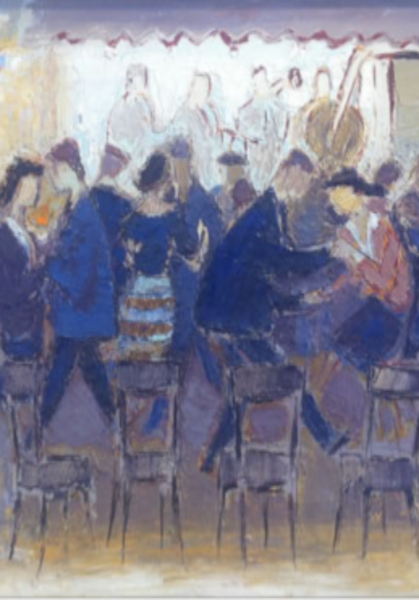Reviewing books is one of the most important aspects of H-France. With no printing costs involved, reviewers are able to write more in-depth analyses than most print journals would allow. H-France reviews are preserved on the H-France web page, where they are easily retrievable and searchable, anytime worldwide. In addition, they may be freely redistributed and reprinted electronically for nonprofit educational purposes, provided that full and accurate credit is given to the author, the date of publication, and its location on the H-France website.
H-France is a service directed and operated by professional scholars of French history and culture. It is because of the editors’ willingness to volunteer their time and energy that the H-France review program is able to operate successfully. We would ask that you respect the editors’ significant contributions by giving due diligence to the guidelines that follow. Preparing your review in accordance with them will be greatly appreciated by your colleagues who will edit your review.
SUBMISSION OF REVIEW
The review should be as an email attachment. Unless otherwise informed, please submit the review to Chris Jones at: chris.jones@canterbury.ac.nz
You will be provided with an opportunity to review galley proofs of your review before it appears. Once you have approved the galley proofs or the galley proofs have been with you for two weeks without a response, the review will be submitted for publication. After that point, the review cannot be withdrawn and no changes can be made in the review.
PRACTICE OF RESPONSE ESSAYS
The book’s author may be invited to offer a response to your review if the editors believe that such an exchange would be illuminating and of interest to other scholars. If this should be the case with the book you are reviewing, you will hear from the editors ahead of time and you will be allowed to see the response before the review and response are jointly published. The book’s author will not be allowed to suggest or demand any changes in your review.
EDITORIAL GUIDELINES
Effectiveness and Content:
The most effective review will place the work within a broader context, explaining what important issues are worth the attention of scholars. Reviews should include a summary of the scope, purpose, and content of the work and its significance in the literature of the subject. Also, reviews should evaluate the strengths and weaknesses of the work, paying attention to the use of sources, methodology, and argumentation in light of the work’s stated purpose. For works designed for classroom use, the review should consider its success and/or limitations as a pedagogical tool and indicate the level of student for which the work was designed and is appropriate.
Audience:
Reviewers should assume a university-educated audience with particular knowledge and interest in French history and culture; however, H-France includes subscribers from many different disciplines and departments, so it is important for a reviewer to provide sufficient information, whether historical, historiographical, or theoretical, so that his or her critique is clear to individuals outside of a specific sub-field.
Professionalism:
Whether the evaluation of a work is favorable or unfavorable, reviewers should express criticism in courteous, temperate, and constructive terms. Reviewers are responsible for presenting a fair and balanced review and for treating authors with respect. H-France editors will be responsible for maintaining a constructive review process and may ask reviewers to reword or rewrite sections of their reviews. Reviewers will be given the opportunity to agree to all proposed substantive changes. H-France editors will have final determination on stylistic issues. H-France editors reserve the right not to post reviews and responses that violate H-France guidelines. At the discretion of the editors, the author of a work under review may be invited to prepare a response to the review, and the posting of a review may be delayed briefly to permit the author time to respond. Finally, it is essential that the review represent your individual scholarly judgment, so that we ask that you not include collaborators or designate someone else to prepare the review without first receiving permission from the Chief Review Editor.
Copyright information:
Reviewers publishing reviews on H-France Reviews grant and assign to the Society for French Historical Studies any and all rights covered by the Copyright Law of the United States and those of all foreign countries in and to the published review. The Society for French Historical Studies grants to the Reviewer the unrestricted right to use his or her review for non-commercial purposes.
World Wide Web:
All H-France solicited reviews will be published through the World Wide Web at: http://www.hfrance.net/reviews/list.html
STYLE GUIDELINES
The editorial guidelines given below are designed for reviews written in English. Reviews written in French should apply these same principles to their reviews, making the necessary adjustments for French rules on grammar and punctuation.
I. Header
All reviews must be headed with the full information concerning the book, using the following models:
Peter McPhee, Revolution and Environment in Southern France: Peasants, Lords, and Murder in the Corbières 1780-1830. Oxford and New York: Oxford University Press, 1999. xi + 272 pp. Maps, tables, figures, notes, bibliography, and index. $75.00 U.S. (cl). ISBN 0-19-820717-4; $24.00 U.S. (pb). ISBN 0-19-820717-X
Robert Aldrich and Martyn Lyons, eds., The Sphinx in the Tuileries and Other Essays in Modern French History: Papers Presented at the Eleventh George Rudé Seminar. Sydney: University of Sydney Press, 1999. vi + 399 pp. Notes. $54.00 U.S. (cl). ISBN 1-86487-026-5.
For film reviews:
Ben Lewis, director. Blowing Up Paradise 60 min. DVD and VHS. (First Run/Icarus Films, 2005). $390.00 U.S.
In listing the publisher and place of publication in the header, there are three rules:
- If the state is named in the name of the publisher, then it is not included in the place. So Lexington: University Press of Kentucky and Ithaca, N.Y.: Cornell University Press.
- We use “literary” abbreviations for states, rather than postal codes; so Conn., not CT, Del., not DE.
- Generally, if a publisher has U.S. and non-U.S. offices, we try to list one of each, since folks all over the world access the web pages. So Cambridge University Press is Cambridge and New York. This is only true for the bibliography on the book under review (not in the notes)
Please remember that books have “Forewords”–not Forwards.
Abbreviations: For cloth (cl) For Hardback (hb) For paperback (pb) For electronic books (eb)
The “N” in ISBN stands for Number, so don’t say, “ISBN No.” For electronic books with an ISBN, cite the actual e-format (Kindle, Nook, I-Pad, etc.); with no ISBN, use “digital file.”
Following the bibliographic reference, all reviews should carry the following line, adapted as appropriate:
Review by <<reviewer’s name, reviewer’s institution>>. The exact month and year of publication will be checked at the time the review is published to the list and web page.
II. Text
Length:
H-France is flexible concerning the length of reviews. In general, reviews should be between 1500 and 2500 words but certainly may be shorter. If a review will exceed 2500 words, please consult with the editor.
Formatting:
All reviews should be single spaced. Between paragraphs, a blank line should be inserted and new paragraphs should not be indented.
Endnotes:
Reviewers must use endnotes rather than footnotes. The note citation in the text should be placed in a bracket, following any punctuation:
As Butel has argued, “The past never dies.”[4] Jones further asserts……
PLEASE NOTE: Please make sure that your endnotes are prepared as part of the text, NOT as superscripted numbers created by an automated endnote function in your word processing program. Also, please make sure that the notes themselves, appearing at the end of the text, are NOT prepared with an automated program. These automated programs create considerable extra work for the editors when they transform your word processed reviews into email messages in preparation for distribution to the list.
Page Number references to text under review:
Page numbers should be supplied for all quoted passages or to reference particular points of interest or importance. The page number reference should be placed in parentheses and set inside of any punctuation marks (notice how this differs from the endnotes that are placed in brackets and set outside of any punctuation marks):
“… does not really answer the question” (pp. 235-36).
Varia: Dates, Numbers, Percentages, Ellipses, Dashes.
Spell out names of centuries, and hyphenate when they are adjectives: “eighteenth-century literature.”
Spell out most numbers under 100; BUT use Arabic numerals in “10 percent.”
Use “…” for ellipses, and “….” if a sentence ends in the omitted part; For dashes, use a double short dash with no space before or after the dashes.
Capitalizations:
All of the following terms are NOT capitalized unless used as part of a proper name: church, mass, faith, popes, kings, the papacy, ancien regime.
Proper names, including established denominational and religious appellations and national/ethnic designations ARE capitalized: Pope Leo X, King Louis XIV, Roman Catholic Church, Christian, Protestant, Jew, French Canadian, Basque, Alsatian, etc.
Names of languages are capitalized: French, English, etc.
When referring to chapter numbers, use the form “chapter one”–do not capitalize or use numerals.
When referring to the division of a book into several parts, use the form “part one”–do not capitalize or use numerals.
Use of Italics
Italicize ALL foreign words and short phrases. Try to avoid foreign words and phrases if an acceptable English alternative exists.
Exceptions:
Do NOT italicize long quotes in other languages contained by quotation marks. Accepted usage is that words in foreign quotes are ONLY italicized if that is how they appeared in the original. The reason for this is because the words are not “foreign” in the original.
Do NOT italicize foreign terms commonly used in English (e.g., modus operandi, fait accompli, ancien regime). Consult the Oxford English Dictionary to determine whether or not a word is accepted in English.
Do NOT italicize names of institutions, parties, and place names (e.g. Chambre de l’Édit, Parti Communist, and Palais Royal).
Reviewers of Edited Collections:
Please include a “LIST OF ESSAYS” (with the author’s name and title of each article/chapter) immediately after the text.
Notes
Endnotes are placed after the text (and List of Essays for edited collections) but before the attribution of authorship and copyright notices, following the word “NOTES”.
Any book, edited collection, essay in an edited collection, article, dissertation/thesis, or web site referred to in the body of the review is to be fully referenced in an endnote, including full publication information and/or URL.
Full publication information must conform to the following formats:
Book: Charles Zika, Exorcising Our Demons: Magic, Witchcraft and Visual Culture in Early Modern Europe (Leiden: Brill, 2003).
Edited collection: Robert Aldrich and Martyn Lyons, eds., The Sphinx in the Tuileries and Other Essays in Modern French History: Papers Presented at the Eleventh George Rudé Seminar
(Sydney: University of Sydney Press, 1999).
Essay in edited collection: Gary Kates, “Jews into Frenchmen: Nationality and Representation in Revolutionary France,” in Ferenc Fehér ed., The French Revolution and the Birth of Modernity (Berkeley and Los Angeles: The University of California Press, 1990), pp. 105-107.
Article: Gary Savage, “Favier’s Heirs: The French Revolution and the Secret du Roi,” Historical Journal 41(1998): 225-258.
Dissertation/Thesis: Marilyn Kay Chatham Goldman, “Jewish Fringes Texas Fabric: Nineteenth Century Jewish Merchants Living Texas Reality and Myth,” (Ph.D. dissertation/M.A. Thesis, Texas A&M University, 2003).
Newspaper: Peter Schütter and Bertrand Müller, “Faut-il brûler Lucien Febvre?” Le Monde, Feb. 8, 1995, 13.
Web site: full URL along with date cited.
Attribution of Authorship:
The following authorship line should immediately preceding the copyright statement:
Jay M. Smith University of North Carolina At Chapel Hill
jaysmith@email.unc.edu
All reviews will carry the following copyright statement at the bottom of the review:
Copyright © 20?? by the Society for French Historical Studies, all rights reserved. The Society for French Historical Studies permits the electronic distribution for nonprofit educational purposes, provided that full and accurate credit is given to the author, the date of publication, and its location on the H-France website. No republication or distribution by print media will be permitted without permission. For any other proposed uses, contact the Editor-in-Chief of H-France.
H-France Review Vol. ? (Month 20??), No. XXX. ISSN 1553-9172
If you have further questions regarding the preparation of reviews, please contact the Chief Editor of H-France Review.
POLICY ON ALLEGATIONS OF MISAPPROPRIATED SCHOLARSHIP
The following outlines the procedures used when a reviewer brings an accusation of Misappropriated Scholarship in a review commissioned by H-France for publication in H-France Review.
- A reviewer brings evidence of misappropriated scholarship in a book that the reviewer has been asked to review.
- The Chief Book Review Editor and Editor-in-Chief make an initial determination, based upon the reviewer’s presentation of this evidence, as to whether or not there is substantial evidence that the author of the book has made unattributed use of other scholars’ ideas and arguments.
- If the evidence is not substantial, the editors communicate such to the reviewer and arrange for the review to be re-written or cancelled.
- If the evidence is substantial, the Chief Book Review Editor and Editor-in-Chief work with the reviewer to prepare a review that provides clear evidence of the allegation being made. Since H-France reviews are not limited by space considerations, appendices can be provided that use side-by-side text comparison to demonstrate appropriated material. In addition, the Editors can guide the reviewer towards wording that expresses the problems of scholarly integrity within a work without using inflammatory language.
- The Editor-in-Chief appoints two persons from the Editorial Board, to be joined by two persons appointed by the Executive Director of the Society for French Historical Studies (SFHS), to a Review Committee to have authority over any publication decisions.
- The Editor-in-Chief presents the review to the Review Committee, seeking its authorization to proceed with publication. The Committee will seek legal counsel if it believes it should.
- The Review Committee may:
- reject publication of the review if it concludes that the review does not substantiate its charges or that the review’s allegations are excessive.
- pass the review back to the Editors, requiring revisions before publication, which the Editors will pursue with the reviewer.
- approve the review for publication.
- Once the Review Committee approves publication of the review, the Editor-in-Chief will contact the author of the book in question, offering him or her the opportunity to prepare a timely response essay. In addition, the author of the book may request that the Review Committee reconsider its authorization to publish based upon evidence that the author provides which demonstrates that the evidence provided by the reviewer in the review misunderstands or misrepresents the material presented in the book. If the author of the book chooses not to write a response essay or fails to write one in a timely manner (generally within three weeks), The Editor-in-Chief may proceed with publication of the review.
- Once the response essay is submitted to the Editor-in-Chief, the Editor-in-Chief and the Chief Book Review Editor edit the response essay in consultation with the author of the book.
- When the Editors and the author of the book agree on a final text for the response essay, the response essay is given to the Review Committee for its approval before publication.
- The Review Committee may approve or seek revisions of the response essay. Once the Review Committee authorizes publication, the Editor-in-Chief will then seek final preparation for publication to the list and web page of the review and the response essay.































